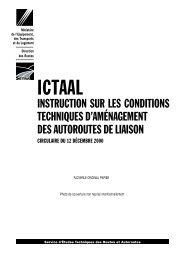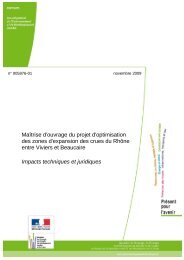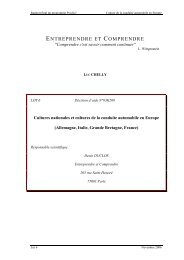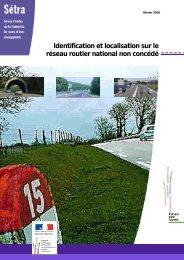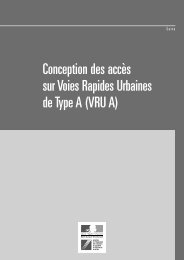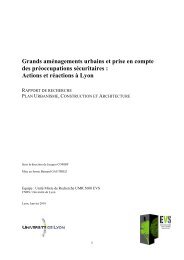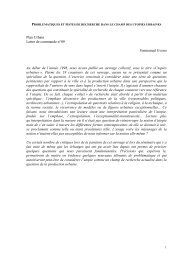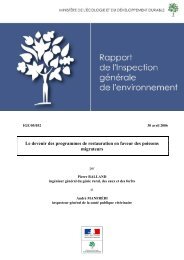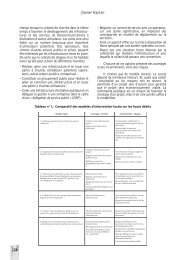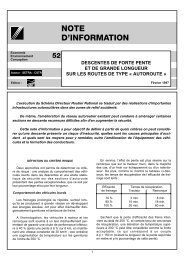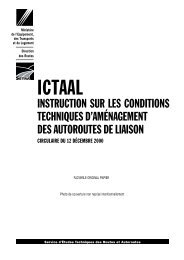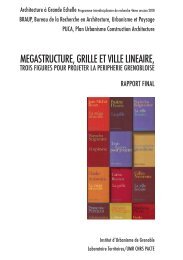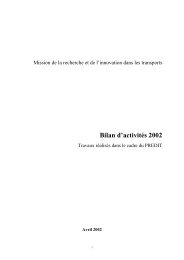des tic et des territoires - Portail documentaire du ministère de l ...
des tic et des territoires - Portail documentaire du ministère de l ...
des tic et des territoires - Portail documentaire du ministère de l ...
Create successful ePaper yourself
Turn your PDF publications into a flip-book with our unique Google optimized e-Paper software.
communicate, management of uncertainties, reactivity<br />
to events, <strong>et</strong>c.). Knowledge and comp<strong>et</strong>ence<br />
themselves are becoming a direct factor of pro<strong>du</strong>ction.<br />
A significant feature for the future of work in<br />
the information soci<strong>et</strong>y is the shift from qualification<br />
requirements to comp<strong>et</strong>ence requirements.<br />
New forms of organisation supported by ICTs make<br />
the distinction b<strong>et</strong>ween qualification, skill or comp<strong>et</strong>ence<br />
less and less clear [Dubé & Mercure, 1997;<br />
Zarifian, 1996]. The usual distinction b<strong>et</strong>ween qualification<br />
and skill lies in the fact that qualification is<br />
attached to the workplace, while skill or comp<strong>et</strong>ence<br />
belongs to the worker. Qualification <strong>de</strong>pends on<br />
organisational options, human resource management,<br />
collective agreements and technology. Skill<br />
and comp<strong>et</strong>ence are related to e<strong>du</strong>cation, training<br />
and experience of the workers, and to their personal<br />
capacities.<br />
In the firms where ICTs are wi<strong>de</strong>ly implemented,<br />
the recruitment requirements and the <strong><strong>de</strong>s</strong>cription<br />
of functions are mainly based on comp<strong>et</strong>ence.<br />
This is an important shift from a collective to an<br />
indivi<strong>du</strong>al approach of qualification.<br />
Some authors go further in the analysis of such<br />
a shift from qualification to comp<strong>et</strong>ence.<br />
“Comp<strong>et</strong>ence appears as a substitution process; it<br />
challenges the recognition and validation of knowledge<br />
and know-how through the wage system.<br />
Comp<strong>et</strong>ence leads to a new mo<strong>de</strong>l of the “pro<strong>du</strong>ctive<br />
indivi<strong>du</strong>al”. It generates a specific mo<strong>de</strong>l of<br />
human resource management, not centred anymore<br />
on qualification and employment, but on the indivi<strong>du</strong>al.<br />
(...) Moreover, does the shift from the qualification<br />
mo<strong>de</strong>l to the comp<strong>et</strong>ence mo<strong>de</strong>l represent<br />
another shift, from wage earning to entrepreneurship<br />
? Are comp<strong>et</strong>ence and employability som<strong>et</strong>hing<br />
similar for entrepreneurship, as qualification<br />
and employment are for wage earning ? (...)<br />
Comp<strong>et</strong>ence can be un<strong>de</strong>rstood as a new form of<br />
bargaining qualifications, in a context of technological<br />
change and economic change”. [Brangier &<br />
Tarquinio, 1997]<br />
Comp<strong>et</strong>ence is often put forward when discussing<br />
the professional profiles of distance workers<br />
or teleworkers. More generally it seems that, whatever<br />
can be the sectors or the jobs, the use of<br />
advanced communication technologies increases<br />
the comp<strong>et</strong>ence requirements for the workers.<br />
Flexible Labour Mark<strong>et</strong>s<br />
Telework in the scenarios for the future of work<br />
It is an<strong>tic</strong>ipated that a key element in the information<br />
economy will be flexibility: of indivi<strong>du</strong>als, of<br />
organisations, of institutions and of soci<strong>et</strong>y in general.<br />
Flexibility is very much a portmanteau word,<br />
however, and carries many different meanings to<br />
different people. It is often suggested that flexibility<br />
will be a key element in enhancing economic comp<strong>et</strong>itiveness<br />
and that the future economic health of<br />
Europe will rely to a large extent on the ability of<br />
economic actors and supporting institutions to<br />
<strong>de</strong>velop such flexibility.<br />
Flexibility is generally used to <strong>de</strong>note a new<br />
organisational form, wh<strong>et</strong>her at the level of the firm<br />
or at soci<strong>et</strong>al level, contrasting this with those<br />
organisational system(s) generally known as Fordist<br />
or Taylorist, forms which are said to have characterised<br />
in<strong>du</strong>strial economies <strong>du</strong>ring the period from<br />
around the 1920 to the early 1970s. For the era of<br />
1980s and 1990s characterised by globalisation,<br />
increasing comp<strong>et</strong>ition, more dynamic mark<strong>et</strong>s,<br />
greater and more sophis<strong>tic</strong>ated consumer <strong>de</strong>mands,<br />
greater uncertainty, rapidly <strong>de</strong>creasing cycles of<br />
technological innovations, and the emergence of<br />
new information and communication technologies,<br />
it is argued that we need more dynamic and flexible<br />
organisational and institutional structures.<br />
Within this framework of flexible organisation,<br />
various scenarios of the future of work <strong>de</strong>velop new<br />
visions of the labour mark<strong>et</strong>. Beyond the classical<br />
labour mark<strong>et</strong> with a classical organisation of economic<br />
activities and “typical” workers’ status conditions,<br />
a lot of new forms of organisation and status<br />
conditions are <strong>de</strong>veloped, analysed or taken into<br />
account. Flexibility is a common character of these<br />
“atypical” labour mark<strong>et</strong>s. Some visions of the<br />
future of flexible labour mark<strong>et</strong>s are oriented<br />
towards social integration (through i<strong>de</strong>as such as<br />
plural economy, intermediary activities, quaternary<br />
sector, or transitional labour mark<strong>et</strong>s), while others<br />
lead to a growing indivi<strong>du</strong>alis<strong>tic</strong> culture (through<br />
i<strong>de</strong>as such as self-employment, self management or<br />
employability).<br />
Telework or distance working may belong to<br />
each type of scenario even if, in Europe, the ten<strong>de</strong>ncies<br />
seem also to be different from a country to<br />
another, with quite different ways of implementing<br />
flexible labour mark<strong>et</strong>s in the Nordic countries and<br />
in the rest of Europe.<br />
Flexible Labour Mark<strong>et</strong>s oriented towards<br />
Social Integration<br />
Unemployment and exclusion are more than a<br />
problem related to conjuncture. Soci<strong>et</strong>y is changing;<br />
social cohesion, work and its connection with<br />
growth are in a crisis. Insecurity is growing not only<br />
in the “peripheral” labour mark<strong>et</strong>s but also in the<br />
“core” labour mark<strong>et</strong>. Atypical employment is growing,<br />
precariousness and unemployment too, par<strong>tic</strong>ularly<br />
at the beginning and at the end of a professional<br />
career. In this soci<strong>et</strong>y, work can no longer be the<br />
only reference for the socialisation of indivi<strong>du</strong>als.<br />
83



